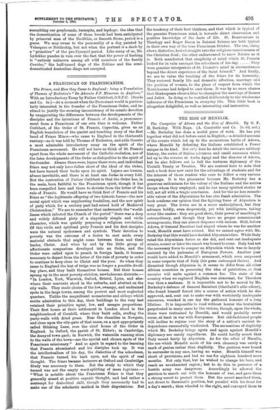A FRANCISCAN ON FRANCISCANISM.
The Friars, and How they Cams to England : being a Translation of Thomas of Eecleston's "De Adventu P.P. Minorum in Angliam." With an Introductory Essay by Father Cuthbert, 0.S.F.C. (Sands and Co. 6s.)—At a moment when the Protestant world is particu- larly interested in the founder of the Franciscan Order, and in- clined to justify the seeming inconsistency of its erratic devotion by exaggerating the differences between the developments of the disciples and the intentions of Francis of Assisi, a pronounce- ment from a Franciscan of our own time is welcome. Father Cuthbert, of the Order of St. Francis, Capuchin, gives us an English translation of the quaint and touching story of the first band of Friars Minor—who came to England in the thirteenth century—as it was told by Thomas of Eccleston, and adds thereto a most admirable introductory essay on the spirit of the Franciscan movement. He will not have us think of St. Francis apart from the whole movement of the Catholic evolution, nor of the later developments of the Order as disloyalties to the spirit of the founder. Abuses there were, lapses there were, and individual friars may not only have fallen short of the ideal of the Order, but have turned their backs upon its spirit. Lapses are human, abuses inevitable, and there is at least one Judas in every fold. But the contention of Father Cuthbert is that the Order has, in the main, been faithful to the Franciscan spirit, though it has been compelled here and there to deviate from the letter of the rule of Francis. He would have us think first of Francis and his friars as "the legitimate offspring of two historic forces—the new social spirit which was supplanting feudalism, and the new spirit of piety which for a century past had seized hold of Mediaaval Christendom." We are to remember that underneath the "world- liness which infected the Church of the period" there was a deep and widely diffused piety of a singularly simple and virile character, which was quietly preparing a religious revolution. Of this virile and spiritual piety Francis and his first disciples were the natural spokesmen and symbols. Their devotion to poverty was the outcome of a desire to cast aside every material obstacle that might come between them and their leader, Christ. And when by and by the little group of affectionate companions developed into an Order, and the Order were called upon to preach in foreign lands, it became necessary to depart from the letter of the rule of poverty in order to continue to keep close to Christ and the poor. So when they came to England the hut of twigs was no longer a possible dwell- ing place, and they built themselves houses. But their houses sprang up in the most poverty-stricken, unwholesome districts :- "In London, York, Warwick, Oxford, Bristol, Lynn, and else- where their convents stood in the suburbs, and abutted on the city walls. They made choice of the low, swampy, and undrained spots in the large towns, among the poorest and most neglected quarters. Unlike the magnificent monasteries and abbeys which excite admiration to this day, their buildings to the very last retained their primitive squat, low, and meagre proportions. Their first house at their settlement in London stood in the neighbourhood of Cornhill, where they built cells, stuffing the party-walls with dried grass. Near the shambles in Newgate, and close upon the city-gate of that name, on a spot appropriately called Stinking Lane, rose the chief house of the Order in England. In Oxford, the parish of St. Ebbe's ; in Cambridge, the decayed town gaol; in Norwich, the waterside running close to the walls of the town—are the special and chosen spots of the Franciscan missionary." And so again in regard to the learning that Francis abominated and his disciples took up. It was the intellectualism of his day, the dialectics of the schoolmen, that Francis turned his back upon, not the spirit of real thought. The friars became lecturers at Oxford and Cambridge. Study was necessary to them. But the study to which they turned was not the empty word-splitting of mere logicians :— " What is notable about the Franciscan Friars is that they generally aimed at positive organic thought, and had rather a contempt for dialectical skill, though they necessarily had to make use of the scholastics method in their disputations. But the tendency of their best thinkers, and that which is typical of the genuine Franciscan mind, is towards direct observation and positive knowledge of the facts of life. St. Bonaventure in Theology and Roger Bacon in Natural Science are both typical in their own way of the true Franciscan thinker. The one, rising above dialectics, looked straight into the religious consciousness of the Christian Soul ; the other endeavoured to know Nature as it is. Both manifested that simplicity of mind which St. Francis
looked for in vain amongst the schoolmen of his day They were genuine interpreters of St. Francis's mind in circumstances beyond the direct experience of the Saint himself." And finally, we are to value the teaching of the friars for its humanity. They restored family life and domestic affection, marriage and the position of woman, to the place of respect from which the Manichaeans had helped to oust them. It was by no mere chance that Shakespeare chose a friar to champion the marriage of Romeo and Juliet. In doing so he testified deliberately to the wholesome influence of the Franciscan in everyday life. This little book is altogether delightful, as well as interesting and instructive.


























































 Previous page
Previous page